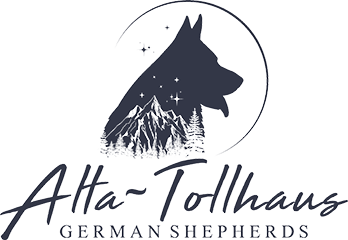Who does the assessment?
SV licensed judges with the BW designation are approved by the SV to judge the ZAP test. From here in out referred to as assessors.
How can the assessor understand my puppy’s reactions when he doesn’t know him?
The assessors have had many years of experience with GSDs of all ages and will be very familiar with how they react and what things might affect the way they behave.
At the start of the assessment, the assessor will ask about the puppy and its handler.
- Does the handler own the puppy?
- Does it live in the house or a kennel?
- Is this the handler’s first puppy?
- Is the handler an experienced trainer?
The assessor builds up a picture of its background, which helps them to understand better how the puppy reacts based on what it may or may not have experienced before.
What does my puppy have to do to pass the assessment?
The assessor is looking to see how the puppy reacts to each of the tasks, each puppy will respond differently, and the assessor will comment on the reaction in terms of how closely it fits with the expectation for a GSD puppy or what it tells us about the puppy’s aptitudes.
There are no points awarded, and no pass mark – the assessor (judge) makes comments about each task.
The ZAP character assessment is not a qualification in its own right. It is a stepping stone to more advanced requirements. It is designed for breeders of German Shepherds but will be interesting, fun, and useful to all owners.
Can my puppy fail the ZAP Character Assessment?
There are three ways in which a puppy can fail the ZAP Assessment:
- The puppy is excessively aggressive
- The puppy is excessively nervous
- The puppy is excessively afraid of the gun test.
Can I retake the assessment if my puppy fails?
The assessment can be taken a maximum of two times.
How can I train my puppy for the assessment?
The most important thing to do in preparation for the assessment is to socialize your puppy. Play with the puppy, handle the puppy, and introduce it to different situations and people. As soon as it is old enough to leave the house, get out and about, enjoy your puppy and introduce it to lots of different people and places.
Is the assessment stressful for the puppy?
The assessment is done in a specific way, with great care being taken not to cause the puppy undue stress.
The puppy will be put in unusual circumstances, though, and its natural reaction may be to become a little stressed. If the puppy is overly stressed, the assessor will stop the task and may stop the assessment.
The assessor leaves plenty of time between tasks to ensure that the puppy is ready to move on to the next one. The amount of time can vary significantly from one puppy to another.
The assessment is likely to take around 30 minutes.
Can I take my puppy into the assessment myself?
Yes, absolutely! The assessment is not physically demanding, and your puppy will likely be at its most comfortable and relaxed when it is with you.

